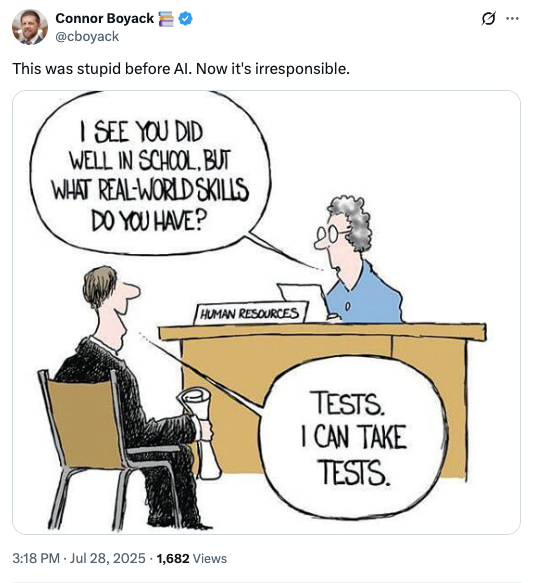.png)
How to teach calculus like a pro (even if you're not a math person)
How to teach calculus like a pro (even if you're not a math person)
How to teach calculus like a pro (even if you're not a math person)
DEEP DIVE: Best Homeschool Math Curriculum
You hear it all the time from people young and old: “I’m not a math person.”
In reality, there’s no such thing.
All humans are born with number sense. Babies a few days old can distinguish between two and three.
But somewhere between preschool and pre-algebra, things go sideways for a lot of kids. Often, it happens when they don't fully grasp a foundational concept before their class moves on anyway. In traditional school, you can't pause for an individual student. They get shuffled forward with the belief that they're "not a math person."
That belief sticks. It becomes self-fulfilling.
This is where open education changes the game. Laura Feller never took calculus. When her youngest son reached algebra, she panicked—how could she teach something she'd never learned? Then she shifted her mindset. She wasn't going to be his math teacher. She was going to be his educational architect. Her job: find the resources that teach it well, get out of the way, and let him learn.
Her son is now doing calculus with a curriculum she's never studied. He calls the company when he gets stuck. Someone answers. He learns. This isn't magic—it's what happens when parents stop thinking they need to know everything and start thinking about which tools fit their kid's brain.
Different kids genuinely need different approaches. Your job is matching the tool to the kid, then being willing to switch if September's choice doesn't work for October.
You don't need a credential. You don't need to have mastered calculus. You just need to be willing to architect.
Read the full deep dive on homeschool math curriculum
PODCAST HIGHLIGHT: The Etsy Effect—How (Not) to Kill Your Child's Passions
Brenna Clarke Gray is an educational technologist who studies how universities buy technology. But her real obsession is this: what kills a kid's love of learning faster than anything else?
Her 8-year-old loves mythology. Stacks of books. Mythology podcasts. A million facts about ancient civilizations from everywhere. She figured: perfect, he'll want to do school projects on mythology.
Wrong.
"Nothing kills intrinsic motivation like assigning grades to it," Brenna says. She saw it happen. The moment she suggested turning his passion into a project, into something graded, something with external standards and expectations—it didn't disappear exactly, but it changed. It became less his and more assigned.
She uses the perfect metaphor: "Everybody who's really good at a craft and then they open an Etsy store and then they hate that craft. As soon as you impose external standards and expectations on that thing you just loved for the love of it—that kills what makes you want to keep learning about it."
Watch the full episode | Explore Brenna's Community of Praxis Podcast
LINKS WE'RE HOVERING OVER
Why Giving Students More Choice Was the Most Punk Rock Thing I Could Do (EdSurge) — A classroom manager learns the hard way that control doesn't equal authority. When students had say in their learning, they stopped fighting the system. Turns out autonomy builds engagement faster than compliance ever could.
To Bullied and Bored Teens, North Star Offers 'Unschooling' — and a Cup of Ramen (The 74 Million) — Ken Danford didn't invent unschooling. He just decided to fund it. Last week's podcast guest was recently profiled in the education newspaper of record, the 74 Million, along with three teenagers who couldn't stomach traditional school but found themselves when given permission to design their own education.
Average College Tuition 2025-2026: $44,961 (Private), $11,371 (In-State Public) (U.S. News) — Average college tuition is at an all-time high. But some schools offer free tuition in exchange for work or service. The real question to ask: what problem is college actually solving? And then, how much?
Finland Doesn't Start Formal Schooling Until Age 7—And Their Kids Score Higher (NPR) — Waldorf schools report the same pattern: kids read later but catch up by fourth grade, often more engaged because they have maturity to understand what they're reading. Less school, more play, better outcomes.
Peter Gray: Kids Come Into the World Biologically Designed to Educate Themselves (Peter Gray Substack) — A research psychologist who spent decades studying how kids actually learn proposes something radical: what if we stopped interrupting their learning instincts?
TOOLS WE'RE BOOKMARKING
LExandria — Free, high-quality civics, history, and economics curriculum for high school. Mapped to state standards with customizable assignments and quizzes. All a la carte, so you pull in what fits.
StoryCon — The legendary teen authors' conference in Salt Lake City returns from February 27 - 28. It's in person, it's huuuuge, and it’s 10% off with code OPENED26.
Math Tools
Khan Academy — The famous platform offering free comprehensive lessons, practice, and adaptive learning. Weak in isolation (pure lecture), powerful as a supplement for review, gaps, or motivated independent learners. Start with free. Upgrade if needed.
Zearn — Free digital math lessons serving 1 in 4 elementary students. Teachers and families can access the full library. Research-backed. When students get stuck, lessons adapt to help them visualize the concept.
DreamBox — Intelligent adaptive learning that adjusts in real time. DreamBox analyzes 48,000 data points per student per hour. Students completing 5+ lessons weekly averaged 30 points more growth than non-users.
Prodigy Math — Gamified practice with 100+ million users. Free version includes all curriculum. Premium adds exclusive pets and badges ($75-360/year), which creates visible class stratification worth knowing about.
IXL — Comprehensive platform with strong research backing (Johns Hopkins study). But read reviews carefully: the algorithm penalizes wrong answers heavily while rewarding correct ones minimally. Some kids thrive. Anxiety-prone kids can struggle. Know your child!
Art of Problem Solving (AoPS) — Problem-solving over procedure. Community of mathematically curious kids. Rigorous and proof-based. Not for everyone, but transformative for the right student. Since 2015, all USA International Math Olympiad team members were AoPS students.
Read Not Guess — Free program that fixes what schools often get wrong: teaching kids to guess words using pictures instead of teaching them to decode. Daily lessons take 5-10 minutes. Try a sample to see if your child can identify letter sounds and blend them.
Math-U-See — Video-based mastery curriculum. Parents don't need to know the math. Lessons walk both parent and student through concepts. If you get stuck, phone support exists. Goes all the way through calculus.
Singapore Math — Visual, conceptual approach using bar models to make relationships visible. Starts concrete, moves to pictorial, then abstract. Great for kids who need to see the why before the how.
Teaching Textbooks — Automated grading, video explanations, less parent involvement. May not be rigorous enough for gifted math students, but liberating for busy parents managing multiple kids. Can switch mid-year without losing continuity.
Aleks — AI assessment creates custom learning path based on knowledge gaps. When Aleks determines a student is ready, they master concepts 90-95% of the time—the highest reported success rate. Excellent for filling specific holes.
Math Academy — AI-powered adaptive learning from elementary through calculus. Uses spaced repetition and mastery-based progression. No formal peer-reviewed studies (claims rest on internal data), but educators note it overstates procedural fluency. Use as supplement, not standalone.
BEST OF /r/homeschool (Reddit)
How Can I Become More Interested in Studying Again? — A homeschooler struggling with lost motivation. They loved learning once, but their parents disengaged. Now they're completely on their own, trying to figure out how to get that spark back. Chime in with your advice!
What's Your Favorite Homeschool Hack You Think Could Help Others? — Parents sharing unexpected wins. The 3D printer that became a creative obsession. The audiobook + physical book combo that changed everything. And quiet time… sweet, sweet quiet time.
All About Reading Budget Alternative? — $250/year for just reading felt like too much. So parents got creative. Among the suggestions: Bob Books, decodable readers, flashcards, games.
TWEET OF THE WEEK
Follow friend-of-OpenEd (and Tuttle Twins creator) @cboyack on X for more bangers like this one, and listen to his episode on the OpenEd podcast!

Subscribe to The OpenEd Daily
Join 17,000+ families receiving curated content to support personalized learning, every school day.
.webp)
.avif)


.png)
.png)
.png)